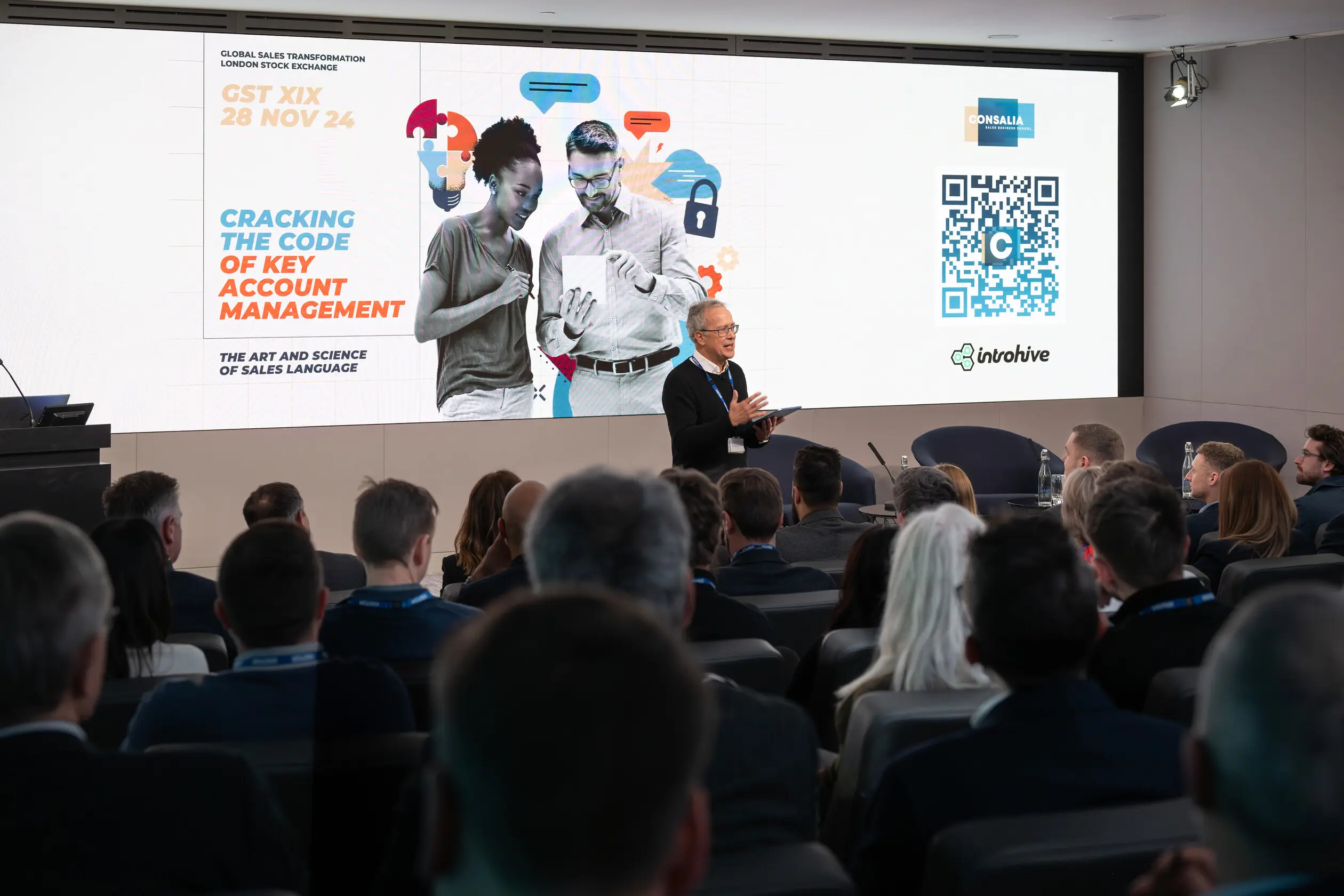Key messages about key accounts
10th January 2025 | Nick de Cent

As key account management becomes ever more important in an evolving sales world, how can organisations hone their approach to strategic and key accounts?
Cracking the code of key account management” was the focus at sales business school Consalia’s 19th Global Sales Transformation conference, held at the London Stock Exchange on 28 November.
Introduced by sales thought-leader and Consalia CEO Dr Philip Squire, the conference brought together around 100 delegates and a range of speakers – two practitioners and an academic, as well as an expert panel – to explore different facets of selling to key accounts.

The first session introduced David Beare, global practice leader, strategy and transformation for Mott MacDonald, a global, employee-owned, engineering, management and development consultancy. He explored his decades-long relationship with Heathrow Airport – the biggest single employment site in the whole of the UK and a major client – and provided some insights into orchestrating a talent network that developed both the individuals involved and the bond between the airport and the supply chain.
Professor Elizabeth Stokoe from the London School of Economics discussed the importance of choosing the right words when seeking to influence a conversation. She illustrated how even seemingly small differences in the choice of words can significantly affect how a person responds. Formerly a professor at Loughborough University, Professor Stokoe has also contributed to the Journal and you can read her article “Keep CARM and talk smarter” here.
She was followed by Luke Skinner from SAP. Previously the global account director for Barclays at SAP, he is now responsible for global strategic initiatives. He shared his personal story in the context of global account management and some of the research he undertook into what it takes to succeed in the role. You can also read a synopsis of his research project “GADs: mindsets, methods and models” in the Journal here.
The expert panel comprised Birgitte Pingel, Vice President-Business Development Leader, Consumer Goods & Retail, Europe at Genpact and David Mines, Commercial Director at Bunzl, and procurement professional Michael Pearson of Inside the Procurement Mind. They discussed a variety of topics but initially focused on both the role of AI in sales and a trend for e-commerce to replace in-person sales, as highlighted by strategic consultancy McKinsey for B2B. You can also read our initial story around these findings here, and a more in-depth interview with two McKinsey partners on pages 8-11 of this edition.

Global account directors: what differentiates the best from the rest?
Luke Skinner, part of the global strategic initiatives team at SAP, discusses the defining characteristics and scope of the global account role, and the qualities needed to succeed.
The life of a global account manager is part strategist, part firefighter, part diplomat, and of course, a highly paid admin. The global account manager, though, is a lot more than that and in my humble opinion, is the lynchpin of an organization.” That’s the view of Luke Skinner who works within SAP’s global strategic initiatives team. Prior to that, he was the SAP’s global account director for Barclays and, during that time, he completed a Master’s degree with Consalia.
Global account managers thrive on the complexity and ambiguity involved in the role – and they create value from that flexibility and ambiguity, Skinner told the audience.
While studying for his Master’s, he came across two academics, Wilson and Millman, who described the global account manager as a “political entrepreneur”. The academics identified global account management as a “boundary spanning role”. The role crosses organizational boundaries with the global account manager sitting at the front of the (internal) organization and interacting with the (external) customer organization.
In this boundary-spanning role, you need both political skills and entrepreneurial skills. “The political skills involve the ability to influence someone without having direct authority over them,” Skinner explained. “We don’t have direct reports. We’re relying on our persuasion and the way that we’re going to take people, and the vision that we set out, to get people inspired to do what we want them to do. And, clearly, on the customer side of the house, it’s all about using our influence and persuasion to get people to buy something and to carry on the relationship and generate goodwill and revenue over time.
Part of the skill is in creating value when things are ambiguous, which involves finding and spotting opportunities that others may not have seen. “Being a global account manager is a boundary-spanning role, but you need both political and entrepreneurial skills to succeed,” Skinner declared.
Foundational characteristics

His own academic work took these concepts a stage further, as he sought to understand the traits you require in order to be successful. “I came up with some foundational characteristics.”
The first of these Skinner identified is integrity. “That is about doing what you say you’re going to do no matter whether it’s uncomfortable or awkward or difficult to do so. I think it’s a core skill of anybody in that space.”
The second skill is empathy, which is about understanding the needs and pressures of those around you. “We all know that, if people feel understood by you, then it creates a better relationship.
Together, these are the building blocks for trust. “In global and key account management, trust is absolutely key. It’s the thing that ensures that you can carry on and pursue opportunities when things get very difficult, and it stops things from falling apart.”
Then of course there’s customer centricity, which means aligning your actions, proposals, presentations, and references within your customer’s, Skinner explained. It’s a balancing act between being on the customer’s side as well as taking into consideration your organization.
Skinner describes these foundational characteristics as really core to any salesperson, whatever their role. “You need to have these in order to progress.”
Leading characteristics
During his research, he also defined what he termed leading characteristics – qualities that set exceptional global account managers apart from the rest. The first of these is what he terms the ambitious visionary. These are the people who inspire their teams, their management and their customers by making big, bold vision statements about where they’re going to take their account.
In sales, we can’t deliver results. That’s not part of what we do. All we can do is try and orchestrate success.
He suggests this is really important for the team because you to have the best people working with you, to support you in your strategy. Similarly, you want to get the customer excited about what you’re doing and where you’re taking them. Finally, and most importantly, you want to be an ambitious visionary for your management team. “That’s not only to get approval and buy-in to what you’re doing, but also to give you the runway to be able to execute against that strategy, which for a global account manager is typically on a three to five-year horizon.”
Skinner’s second leading characteristic was what he called the player-coach. Successful global account managers know how to delegate and allocate resources to make sure they get the best out of people and make sure they can stretch across the whole account. They also know at critical times when to roll up their sleeves and get involved themselves. A player-coach has an ability to speak both confidently and as a peer to C-level executives as well as to the developers and architects. They can have a valuable conversation at each level and they can change the way in which they talk to the people involved at each level.
Skinner’s final leading characteristic is the kingmaker. “The very best global account managers really know where to pull the strings, which people to get involved at the right time, to make the right choice, to do the right thing, to progress the opportunity.”
Time for reflection
He also underlined the importance of taking the time to reflect and look back on your own practice to see how you can improve. “I don’t think that many people do that. I always try to take stock, whether that’s after I’ve had a customer meeting or just about to have one. I consider what I can do to make sure I’m building trust.”
He also stressed the importance of leading with vision. “I ask myself why now? But also, why not? What can we do? Should we be going bigger and bolder? Go big. We often find ourselves negotiating with ourselves. Stretch the team, make them feel slightly uncomfortable when they put that number in there.”
In conclusion, he told the audience: “In sales, we can’t deliver results. That’s not part of what we do. All we can do is try and orchestrate success. If I leave you with one thing for today, great global account managers thrive in the complexity thrust upon us. We build trust and we turn vision into action.
Q&A
Asked what he is looking for from his own sales leaders as a global account manager, Skinner starts by emphasising that any global account manager is the primary expert on their specific customer. “You might not be an expert in anything else, but you are the expert in in that. So, when your management team is asking what you need and how they can help, it’s all about knowing how you can use their seniority to influence someone senior on their side at the right time.
“You always need more runway. So, when I spoke to the management team, under the surface the tone of the conversation would be ‘I need the runway’. You don’t ever ask for that up front, but you do it by getting the buy-in.”
Asked what he needed from sales support to turn his vision for an account into action, Skinner responded that one example could be where a salesperson might need to let go of some short-term sales drivers in the interests of a bundled deal for the client. This might involve a short-term reduction in a specific sale but the ability to have a broader conversation with more people at the client going forward. “We’re obliged to try and convince you to buy into the long-term strategy.”
At the same time, a global account director also needs salespeople to drive their own opportunities. “You do often see instances of product sales specialists hanging onto the coat tails of the global account manager. However, they’ve got to be a salesperson in their own right and develop their own relationships in the account as well. As hard as it always is to break into an account, they have to do that.”
And what of Skinner’s current role? “One of the things that I do within my role at GSI is coaching the sales team and the global account management team.” He explains that this gives them a person to speak and present to who isn’t part of their sales management – people who might be critical about the opportunity from a deal forecasting or a deal update perspective. The other part of the job is taking a more objective view of a deal. This includes aspects of negotiating and structuring the deal, setting out the deal strategy, following the process, and being more objective in those negotiations to obtain a better deal for the whole organization and taking into consideration the customer’s view.

The human factor
AI and e-commerce were scrutinised at one of the most interactive sessions at this year’s GST event. An expert panel involving two sales leaders and one procurement specialist took topical questions from the audience. Compered by Dr Phil Squire, the panel comprised Birgitte Pingel, Vice President-Business Development Leader, Consumer Goods & Retail, Europe at Genpact and David Mines, Commercial Director at Bunzl, alongside procurement professional Michael Pearson of Inside the Procurement Mind.
The panel started by considering a news item in edition 10.3 of the Journal (see “B2B e-commerce unseats in-person sales for second year running”), quoting a recent McKinsey survey which found that “for those companies that are offering e-commerce, it has now dethroned in-person sales for the second year as their top revenue generator”. The survey also found that “B2B companies that blend personalized customer experiences with gen AI are 1.7 times more likely to grow market share than those that do not”.
Scepticism
Dr Squire questioned the findings of the report, saying: “I’m not sure that I believe in this research, even though it’s done across 4,000 different companies globally – the comfort to spend big on transactions of up to $10 million without ever meeting the supplier in person has jumped from 15% in 2022 to 20% in 2024.” He questioned whether companies would really be prepared to invest $10 million in a solution without any interaction with a salesperson.
He asked Mines: “From your experience, are you seeing less and less desire from customers to want to engage with you at a personal level?” Mines responded by highlighting considerable investment in machine learning and AI. “It would be naive for me to sit here and say, well, that doesn’t have a future.” He stressed that, in his market, buyers were becoming increasingly knowledgeable, discerning, and data-driven. However, they don’t necessarily have the required knowledge in house.
He suggested that AI-driven auctions could work for commodity items. However, he added: “AI is only really as good as the information. It can’t, to my mind, create it.” He offered the example of an innovative product with a different specification potentially being ruled out by AI, in which case the purchaser would not be able to take advantage of the innovation. There would be a danger that that potential additional value could be lost.
Pingel questioned how salespeople would differentiate themselves if everybody relied on Microsoft Copilot, based on new data which indicates that 75% are use the AI assistant. “What kind of conversation will differentiate you in your conversation with procurement or with your other buying stakeholders? My superpower is my human interaction. It’s my ability to uncover the right questions.”
Michael Pearson agreed with his fellow panellists and also raised the importance of cultural fit in business relationships. “I think AI will be some way off being able to actually assess that.”
From the audience

Technologist Ivan Roach explored the capability of AI in terms of an IQ comparison with humans. “One of the best ways to look at AI at the moment is the IQ of even ChatGPT is around 60. It’s pushing into around 120. In the next 18 months it’ll get to maybe degree level and then after another 18 months it may get to PhD level.” He suggested the one thing that AI cannot do is actually know the answer. “It currently guesses and gives you its best guess.” He warned: “If you don’t put in the right question and you don’t structure it in the right context, it’ll hallucinate. You’ll believe the hallucination because, again if you’re not recruiting smart people who know what good looks like, you’re going to end up with really dissatisfied customers because procurement will look at you and go, what are you talking about? You’re wasting my time.” The whole point of sales is to be able to provide the right solution to the customer.
Grant van Ulbrich from Royal Caribbean raised the issue of whether an internally built chat tool would be able to describe the benefits of a luxury cruise and its emotional value. He also questioned whether AI is currently always accurate, which risks endangering trust.
Self-service
Dr Squire also sought opinions on the direction of market travel in terms of “customers wanting to push salespeople away”. Brighton Gono from NTT agreed with the McKinsey analysis “to some extent” and that a self-service platform does not necessarily mean it’s AI-driven.
“I’m selling through it. Right now, there is a human element to it, but it’s more of a personality thing with the person I’m selling to give them that sort of hand-holding to close the deal. But they’ve really done everything on the self-service portal.
“I find that, in certain customers, yes, they are pushing more towards self-service and what that is doing for me is creating time for me to talk about more things other than what they already know they want.”
Laura Valerio from Highspot underlined the significant amount of content that buyers have to navigate. A sales team has a key role around the personalization and curation of content. One of the skills that is becoming increasingly important is the ability to listen and to identify the key challenges that customers have. Digital sales rooms, where the seller is able to curate information in a way that really captures what is important for the customer, add significant value. She stressed the importance of salespeople using critical thinking to filter what AI provides in terms of information.

